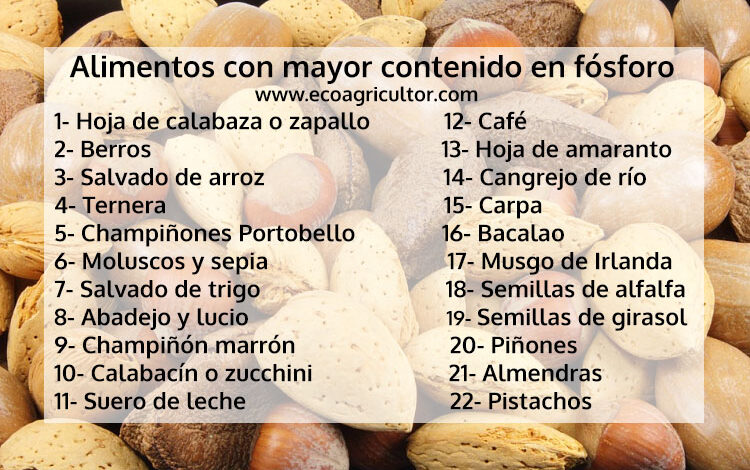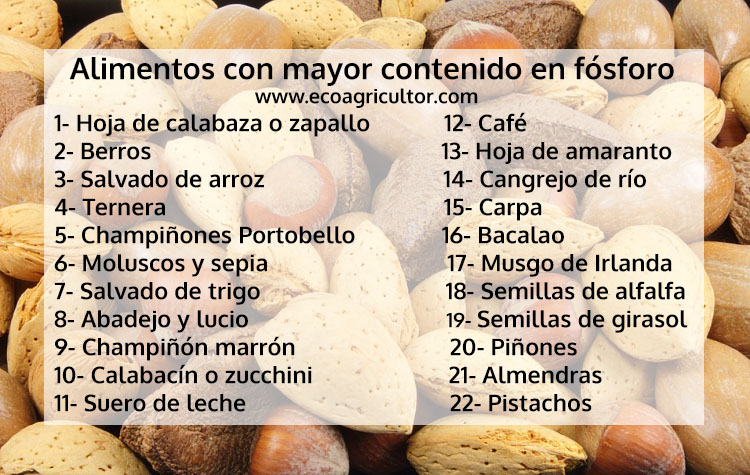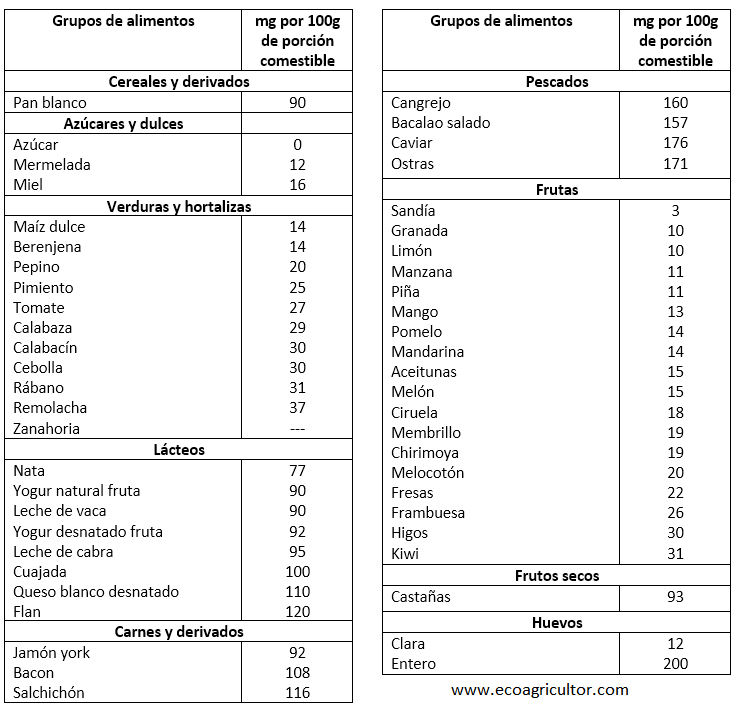Alimentos ricos en fósforo

In the body there are multiple molecules that are essential for its functioning and one of them is phosphorus . This mineral must be ingested through foods that contain it and it is important to include them in our diet in amounts corresponding to those necessary for the body. Both the deficit of phosphorus and its excess can cause health problems.
This mineral is essential in the metabolism of nutrients such as vitamins, ions such as calcium, forming part of cells, bones, other tissues, organs and processes. It is also present in many foods, mainly meats, dairy products and nuts.
In this article you will discover: what phosphorus is, in what functions of our body it participates, what is the recommended daily intake of phosphorus, a table with foods rich in phosphorus and what problems there may be due to the deficit or excess of phosphorus. At the end of the article you will know everything about this important mineral.
What is phosphorus?
Phosphorus (P) is a macromolecule found in all cells and tissues of the body 1 . It belongs to the first category of minerals and is found in amounts of up to 800g in adults, of which the majority (85%) is located in the teeth and bones together with calcium in the form of hydroxyapatite.
The rest is located in the intestine, skin, liver, muscles, nervous tissue, other tissues and in biological fluids in the form of phosphate ion 2
What are the functions of phosphorus?
Being one of the main minerals in the body, it is involved in multiple functions. The main one is the formation of bone and teeth 3 . Among the functions of phosphorus we can highlight:
- Participates in maintaining the acid-base balance of plasma and between cells 1,4
- It plays an important role in the metabolism of carbohydrates, fats and proteins . Helps the synthesis of ATP, a molecule that stores and provides energy to the body 3
- It is part of phospholipids, nucleic acids ( DNA, RNA ) and various enzymes 4
- It is necessary for the body to produce protein for growth 4
- Helps in the functioning of the kidneys, muscle contractions, normal palpitations and nerve signals 3
.
Recommended Daily Intake of Phosphorus
Phosphorus is of great importance in our diet and a certain amount must be ingested daily.
In people with kidney failure these amounts should be moderated or decreased according to the indications of your specialist.
According to age, a determined daily amount of phosphate 3 should be consumed :
- 0 to 6 months: 100 mg / day
- From 7 to 12 months: 275 mg / day
- From 1 to 3 years: 460 mg / day
- From 4 to 8 years: 500 mg / day
- From 9 to 18 years: 1250 mg / day
- Adults: 700 mg / day
- Pregnant or lactating women
- Under 18 years: 1250 mg / day
- Over 18 years: 700 mg / day
Foods Rich in Phosphorus

Phosphorus is a mineral that we can find in different foods, mainly in those that are rich in protein such as meat, fish, dairy products, nuts and some cereals (which are often fortified with this mineral).
Also here you can see a list with the amount of phosphorus per 100 mg in different foods.

Phosphorus deficiency (Hypophosphatemia)
Hypophosphatemia is a rare disease, since phosphorus is available in many foods in our diet. Among the causes of phosphorus deficiency we find 7 :
- Alcoholism
- Hypercalcemia
- Hyperparathyroidism
- Severe malnutrition
- Hereditary causes
- Kidney damage
- Gastrointestinal absorption failure (due to dietary deficiency or functional problems)
- Hormonal problems
- Vitamin D deficiency
- Antacid abuse
- Chronic diarrhea
- Leukemia
- Recovery from diabetic ketoacidosis
- Recovery from malnutrition
Manifestations of phosphorus deficiency only occur in severe cases. Among them we find 8 :
- In the nervous system, symptoms of metabolic encephalopathy, without delusions
- At the hematological level, rigidity of the membranes and hemolysis. Also metabolic acidosis and infection
- In bones, in children, it is associated with rickets and in adults with osteomalacia
- It produces pain and muscle weakness, myopathies and rhabdomyolysis, which can cause heart and respiratory failure
Toxicity due to excess phosphorus
High concentrations of phosphorus in the body can cause hypocalcemia , this is generally associated with kidney problems or very poor regulation of calcium 6
Recommendations in people with kidney disease 9
- Decrease consumption of meats and increase that of legumes and vegetables
- Use coffee beans and not soluble
- Take precautions with processed and refined foods. Read the food label to see if it has added phosphorus or if the word FOS (PHOS) appears if so, discard it
Generally, diet control is accompanied by the indication of drugs that encapsulate phosphorus in the digestive tract, it is always important to consult a specialist
References
- https://www.rdnattural.es/blog/fosforo/
- https://www.ipni.net/ppiweb/iaecu.nsf/$webindex/8F8A81C8E455D68F05256BE3002B04F0/$file/F%C3%B3sforo-Un+nutriente+esencial+en+la+dieta+humana.pdf
- https://medlineplus.gov/spanish/ency/article/002424.htm
- https://www.fundaciondelcorazon.com/nutricion/nutrientes/835-fosforo.html
- https://espanol.stjude.org/content/dam/es_LA/shared/www/do-you-know-spanish/nutrition-phosphorous-spa.pdf
- https://enfermeriaintensiva.files.wordpress.com/2011/04/metabolismo-del-fosforo-lovesio.pdf
- https://www.researchgate.net/publication/250772874_Hypophosphatemia_e_hyperphosphatemia_concept_physiopathology_etiopathogenesis_clinica_diagnostico_y_treatment
- https://www.revistanefrologia.com/es-publicacion-nefrologia-articulo-del-calcio-el-fosforo-el-magnesio-XX342164212000477
- https://www.kidney.org/sites/default/files/NutritionFlyers_SPAN_Phosphorus.pdf
- Sandoz Nutrition Food Composition Tables. Barcelona, 1977.



![Photo of Summer Flowers: [Names, List, Characteristics and Care]](https://www.complete-gardening.com/wp-content/uploads/2022/08/summer-flowers-names-list-characteristics-and-care-390x220.jpg)
